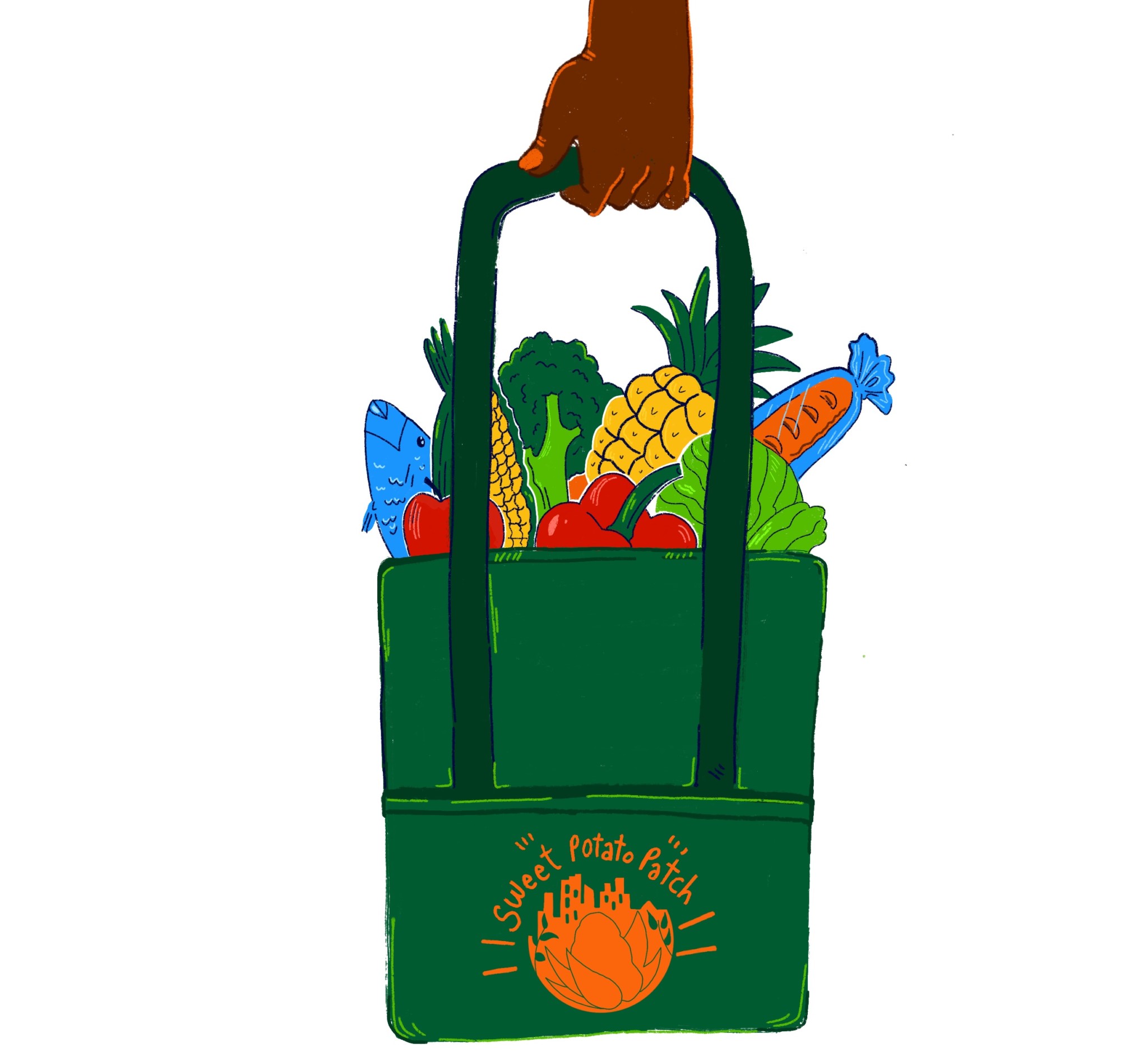When many of us reflect on our lives, we often find a seed of change somewhere early on: a moment or mentor that would spur us along our path. For Stacy Minor, founder and owner of Sweet Potato Patch, the memories that propelled her to creating one of the first South Side–based grocery- and meal-delivery apps were of her family’s lengthy journeys away from her childhood neighborhood in order to buy fresh produce.
Growing up in Roseland on the far South Side, Minor experienced first hand the growth of “food deserts”—areas of the city with little to no access to fresh produce and affordable groceries. Minor recalls her family going as far as south suburban Homewood in order to get access to fresh fruits and vegetables.
During Minor’s childhood, Chicago’s South and West Side communities were beset by dual calamities: the rapid and colossal economic disinvestment that gave rise to such food deserts and the arrival of planet-sized big-box stores like Walmart. The competition from these newcomers functioned like the Death Star: hoovering up smaller life forms and destroying everything else.
“It bothered me, because not only did these stores come in with little regard to the existing businesses that were there and basically put them out of business, because this was like a big new shiny store, but when they decided to leave, what alternatives were left in our community other than big gaping holes?” Minor said.
In considering the effects of food deserts on their surroundings, Minor drew a sharp corollary between the demise of mom-and-pop corner stores and the increase in crime and disinvestment. These searing memories have gone on to inform Minor throughout her life. After high school, she graduated from the University of Illinois, where she was one of the first African-American women to study plant biotechnology, then a nascent field of study. She decided to pursue the major out of a sense of wanting to be a part of food production for communities in need, and she threw herself into her studies.
After graduation and a period working at Monsanto, the former agrochemical and biotechnology giant, in 2019 Minor put her efforts into establishing Sweet Potato Patch to address the concerns that had been nagging her for years.
The premise is simple: customers order food—through either the website or an app—that gets delivered on a weekly basis. Users must first register and then, after being contacted by a Sweet Potato Patch representative, can order very reasonably priced deliveries of meals or produce.
From the user’s point of view, Sweet Potato Patch functions similarly to other meal delivery apps, but it distinguishes itself with a decidedly local and community-oriented focus. Sweet Potato Patch works with local farmers of color, particularly those on the South and West Sides who the big box retailers shun, either because their goods don’t meet the retailers’ requirements for appearance—Minor’s anecdotes here border on horror stories, like entire shipments of produce from local farmers being refused for small imperfections—or because they have to meet stringent USDA regulations that produce imported from abroad doesn’t have to.
When small-scale local farmers, without the armies of chemists, chemicals, and production scales that corporate growers enjoy, have to compete with beauty pageant produce, they inevitably come up short. Small farms also find it difficult to compete with the logistical advantage large farms have to supply a wide variety of cheap produce year round, regardless of the season.
It’s a particularly nasty and seldom discussed effect of global supply chains, and as a result startups selling misshapen and lumpy fruits and vegetables are springing up around the country like mushrooms after the rain. Here in Chicago, Sweet Potato Patch aims to work as a much-needed bridge of sorts, connecting local small-scale farmers of color to communities that are food insecure and would gladly buy their harvests. So instead of throwing away tons of food annually that they can’t sell—tomatoes that aren’t round, uniformly red and unblemished, or oddly-shaped eggplants—local farmers sell it to Sweet Potato Patch, where it is sold to consumers and also repurposed into meal kits.
Despite popular startup shows like “Shark Tank” and “Dragon’s Den,” funding for startups has long been an area of concern for entrepreneurs of color. A Stanford University study found that only one percent of Black-owned businesses receive loans in their first year, which is seven times lower than the percentage for white businesses. Minor said that minority startups need to have a company and product ready to go, whereas many startups run by white entrepreneurs can win investment with nothing more than an idea.
Nevertheless, Minor has had an impressive degree of success in securing funding for Sweet Potato Patch. In May, she was among the first recipients of an American Heart Association Social Impact Fund grant, which targets companies that work “to help communities develop sustainable solutions addressing social determinants of health.”
With Sweet Potato Patch up and running, Minor also hopes to launch another product line of meal kits targeting chronic health concerns.
Startups, by their very nature, often lend themselves to grand plans and sweeping ambitions. Many much-ballyhooed dreamers never, for whatever roll of the dice, quite make it. However, armed with the background, backing, and motivation to carve a path for Sweet Potato Patch in the increasingly crowded meal delivery app field, Minor seems to be off to a good start.
“You think that the biggest way to kill off people is through putting guns and drugs in the neighborhood,” said Minor, “but no, it’s also to cut off healthy food supply.”
James Garrison is a teacher, freelance writer and South Side native. He was a South Shore captain for the 2020 edition of Best of the South Side.

